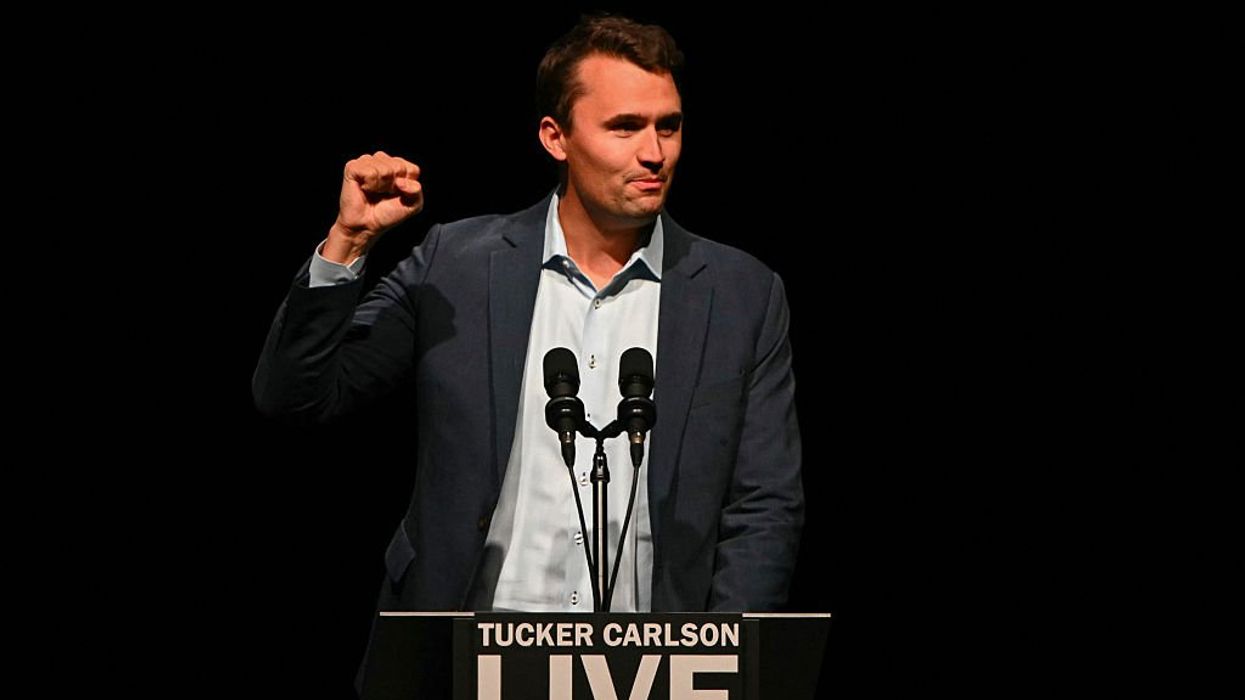David Barton will be joining Glenn on Wednesday's Glenn Beck Program to discuss the standoff in Nevada. David knew several people who were on the ground at the ranch, and he confirmed the violent rhetoric of the people lined up at the gate was not consistent with the general tone of the protestors. With that in mind, Glenn contrasted the state of the United States today versus the state of the country in 1776.
Update: Scroll down to watch a highlight from Glenn's interview with David Barton
“Ever since his Bundy ranch situation thing broke out, our listeners have been asking – some sincerely, some very disingenuously – why I don't believe it's time for violence; and if this isn't it, what is it; and the difference between now and 1776,” Glenn said. “Hmm. That's a hard one. First of all, as an excuse for violent uprising, cattle grazing wouldn't be [at] the tippy top of my list.”
As Glenn explained, Glenn has a “ton of sympathy” for Bundy, but he also recognizes that the rancher did not pay grazing fees for some 20 years. While in theory this should be a solid argument in favor of states rights, Glenn believes the case falls apart when you begin to look at the details.
Don't get me wrong. I have a ton of sympathy for Cliven Bundy. He has sounded like a very nice man to me. But let's not forget he's also a man who decided to not pay his fees for his cattle to graze on the land for 20 years. He is also a guy who wants the federal government disarmed. And he says that beyond the cattle. This is more about getting the United States government to disarm. Again, I would like that to happen. I'm not sure that the cattle rights is the way to make that happen. But that's his stand. And you know, no matter whether you recognize or whether he recognizes the land as federal or not, whether he believes it should be turned over to the state or not, whether I believe it – I do believe that – right now it isn't his land.
So let's try to mold this into a states rights issue or some sort of sovereignty argument. Okay. It doesn't seem like the best case to me. The land isn't his. And he hasn't paid the fees. And I understand all of the things that happened in 1976. I get that. And that is something that there are legislators that are actually trying to work on that, and we should support those people.
When it comes to the differences between the lead up to the American Revolution and today, Glenn sees one major, game-changing difference: Representation. And while that representative system is under attack, Glenn believes it still works.
As far as the difference between 1776 and today: Has anybody noticed that we have representation and they didn't? ‘No taxation without representation.’ I mean, do you think they put Ted Cruz in or you did? Do you think the big government guys put Mike Lee in or you did? Do you think that Matt Bevin is going to be beating Mitch McConnell because of the big government guys or because you will beat him? Which is it? We have representation.
And yes, as we just talked about, I think that we are headed towards an end of that representation. But while it has gotten bad, it is not over yet. That was the biggest issue for those guys, and, you know, a fairly big advantage for us. They didn't have it. We do. There was no one in a position of power for the colonists, no one who could go before the king or parliament and carry any weight. None. I mean they sent Ben Franklin how many times?
We have a constitution. They didn't. And it is hanging by a thread. Something we have warned about. I mean, man, it's on fire right now. But it is there nonetheless providing the protections and the protections the colonists absolutely didn't have. People don't even know the Constitution. How are you expecting people to actually fight for the Constitution or even understand your argument when they don't even know the Constitution?
While the U.S. government is currently spitting on the Constitution, Glenn questioned whether or not we are worse off than Martin Luther King, Jr. was in the 1950s and 60s.
Do you believe that you are as bad or worse off now than Martin Luther King was? I don't. I don't. I hope to never get there, but I don't feel that way. Martin Luther King wanted to defend himself and his family… And he would have defended himself and his family… He applied for a concealed carry permit. He was denied by the white man, by the government. Again, have you been denied your right?
Was Martin Luther King a coward for doing what he did? Was he a coward for doing it? Do you think that it made him popular with everybody in the black community? Do you think it made him popular to take that stand when people wanted blood? They were tired of it, really tired of it. Was he a coward? How long were people engaged in that battle… 200 years? 200 years.
Ultimately, Glenn believes this current movement of small government, liberty-minded Americans standing up for themselves has been about five years in the making, and the movement still has a long way to go before it reaches the tipping point the colonists faced in 1776.
So for possibly five years, some of you are have been actively involved in trying to bring about change. There are other people who have been engaged their whole life… Ron Paul been engaged his whole life and he's been begging people to wake up for a long, long time… [But] en masse… it's just starting to now…
The colonists, they were engaged for decades. They went back and forth to Britain. A 3,000-mile journey over the water in a ship... They took their grievances with them. They did that over and over again for 30, 40 years.
It's not the same. God forbid we ever get there. Maybe we will someday. But it's not now. And peace is the answer.
Watch David Barton and Glenn's full conversation about the conflict in Nevada from Wednesday night's episode on TheBlaze TV. Not a subscriber? Start your 14-day free trial HERE.

 David Butow / Contributor | Getty Images
David Butow / Contributor | Getty Images
 PATRICK T. FALLON / Contributor | Getty Images
PATRICK T. FALLON / Contributor | Getty Images